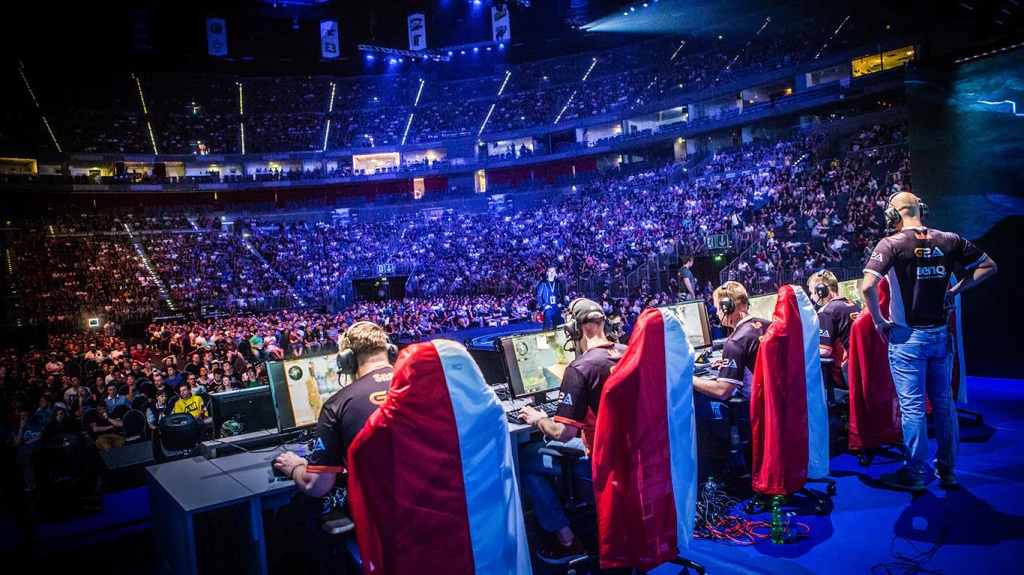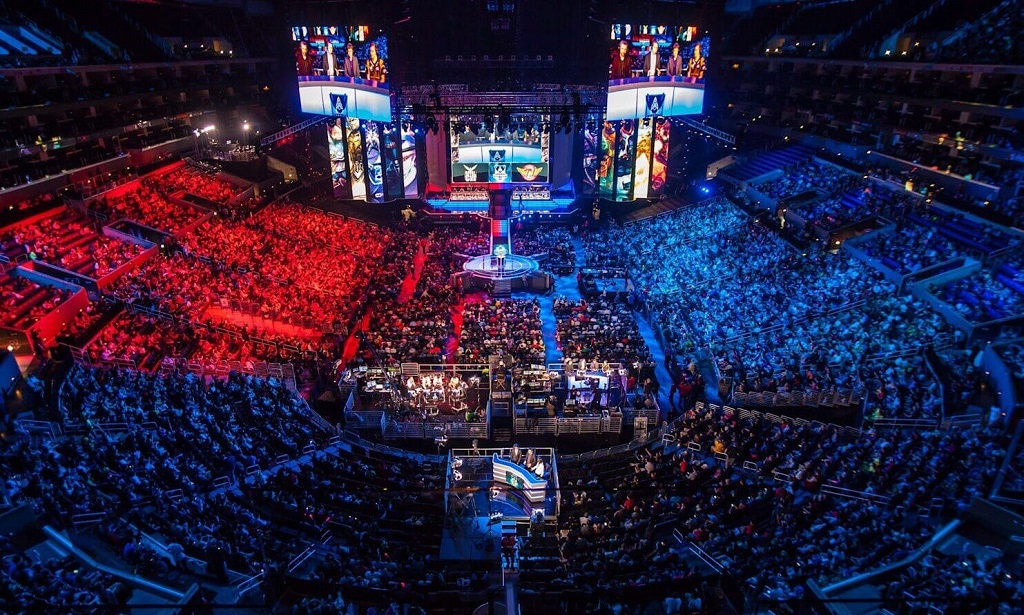The roar of the crowd, the strategic plays unfolding on a digital screen, the thrill of victory – esports, or competitive video gaming, is experiencing a meteoric rise, blurring the lines between traditional sports and digital entertainment. But is this just a fad, or are video games truly becoming the new stadiums, captivating audiences and athletes alike? Let’s delve into the phenomenon of esports and explore its potential for the future.
From Niche to Mainstream: The Rise of Esports
Esports has come a long way from basement LAN parties. Today, it boasts millions of viewers worldwide, professional leagues with multi-million dollar prize pools, and dedicated arenas teeming with cheering fans. This rapid growth can be attributed to several factors:
- The Power of Streaming: Platforms like Twitch and YouTube have democratized broadcasting, allowing anyone to watch professional esports matches live. This accessibility has fostered a passionate and dedicated global fanbase.
- The Rise of Spectator-Friendly Games: Games like League of Legends, Dota 2, and Counter-Strike: Global Offensive offer compelling strategic depth, fast-paced action, and easily digestible narratives for viewers.
- Technological Advancements: High-speed internet connections, powerful gaming rigs, and improved streaming technology have created a smooth and immersive viewing experience for esports audiences.
- The Growth of Gaming Culture: Gaming is no longer seen as a niche activity. The rise of esports has elevated gaming to a more mainstream form of entertainment, attracting a wider audience.
Beyond the Screen: Esports as a Spectator Sport
Esports offers a unique blend of athleticism, strategy, and teamwork. Pro gamers exhibit lightning-fast reflexes, exceptional hand-eye coordination, and the ability to think strategically under immense pressure. Just like traditional athletes, they train rigorously, hone their skills, and dedicate themselves to their craft.
Furthermore, the spectator experience at esports events rivals that of traditional sports:
- Thrilling Live Events: Professional esports tournaments boast packed arenas, passionate fans decked out in team jerseys and electrifying atmospheres.
- Engaging Online Communities: Online forums and social media platforms allow fans to connect, discuss strategies, and celebrate victories, fostering a strong sense of community.
- Fantasy Leagues and Esports Betting: Similar to traditional sports, esports offers fantasy leagues and betting options, adding another layer of engagement for viewers.
The Future of Esports: Beyond Just Games
Esports is still evolving, but its potential is undeniable. Here’s what the future might hold:
- Inclusion in the Olympics: There’s growing discussion about including esports in future Olympic Games, potentially legitimizing it as a mainstream sporting event.
- Expansion into New Genres: Esports could extend beyond traditional competitive titles, encompassing genres like strategy games or even virtual reality experiences.
- Increased Investment: Esports is attracting investment from traditional sports franchises and media companies, suggesting further growth and professionalization.
- Educational Opportunities: Universities are starting to offer esports scholarships and programs, recognizing the potential of esports as a career path.
- Technological Innovation: New technologies like augmented reality could revolutionize the spectator experience, blurring the lines between the physical and digital worlds.
Esports vs. Traditional Sports: A Complementary Landscape
Esports isn’t aiming to replace traditional sports. Instead, it’s carving its niche, offering viewers a different kind of entertainment. Here’s how they compare:
- Accessibility: Esports is more accessible than traditional sports in terms of cost and participation. Anyone with a decent computer and internet connection can potentially compete or watch.
- Global Reach: Esports transcends national boundaries, with online platforms allowing viewers from all corners of the globe to connect and participate.
- Youth Appeal: Esports resonates strongly with younger generations, who are already heavily engaged in the gaming world.
Challenges and Considerations: Addressing the Growing Pains
The rapid growth of esports isn’t without its challenges:
- Sustainability: Ensuring the long-term health and well-being of pro gamers, including addressing potential burnout and physical injuries, is crucial.
- Regulation: Creating a fair and balanced regulatory framework for esports tournaments and betting is essential to maintain a level playing field.
- Diversity and Inclusion: Esports needs to become more inclusive to attract a broader demographic of players and viewers.
Esports: A Sign of the Times
The rise of esports reflects how technology is changing the way we entertain ourselves and compete. It’s a testament to the passion and dedication of gamers worldwide and offers a glimpse into the future of sports and entertainment. Whether you’re a seasoned gamer or a curious newcomer, esports is a phenomenon worth exploring.
Exploring the Esports Ecosystem: Where to Begin
Here are some resources to help you delve deeper into the world of esports:
- Streaming Platforms: Twitch and YouTube Gaming offer live broadcasts of professional esports tournaments, allowing you to experience the action firsthand.
- Esports Leagues and Tournaments: Explore websites dedicated to specific esports titles, like League of Legends Esports (LoL Esports) or Dota 2 Champions Tour, to learn about upcoming events and team standings.
- Esports Documentaries: Several documentaries explore the history and culture of esports, offering insights into the lives of pro gamers and the inner workings of the esports industry.
- Esports News Sites: Websites like ESPN Esports or Dot Esports provide news articles and analysis on esports tournaments, teams, and players.

Becoming an Esports Fan: Engaging with the Community
There are many ways to become an esports fan:
- Choose a Team: Many esports titles have established professional teams with loyal fan bases. Research different teams and choose one to support.
- Join Online Communities: Forums, subreddits, and Discord servers dedicated to specific esports titles offer a space to connect with other fans, discuss strategies, and share your passion.
- Engage on Social Media: Follow esports teams, leagues, and players on social media to stay updated on the latest news and engage in discussions with other fans.
Esports: A Career Option? Exploring the Possibilities
For some, esports isn’t just entertainment; it’s a potential career path. Here are some possibilities:
- Professional Gamer: The pinnacle of esports is becoming a professional gamer, competing for top teams and prize pools. However, the competition is fierce, and dedication is key.
- Esports Coaching and Analysis: As the industry matures, there’s a growing need for coaches and analysts to help teams strategize and improve their gameplay.
- Esports Content Creation: Streaming, commentating, and creating esports-related content can be a viable career option for passionate gamers.
- Esports Management and Operations: The esports industry needs skilled individuals to manage teams, organize events, and handle business operations.
Related: What are 8 Types of Games?
The Takeaway: Esports – A New Frontier for Entertainment
Esports isn’t just a fad; it’s a booming industry with the potential to redefine the landscape of entertainment. While there are challenges to address, the future of esports is bright. Whether you’re a casual viewer or an aspiring pro gamer, there’s something for everyone in this dynamic and exciting world. So, grab your virtual controller, tune into a tournament, and experience the thrill of esports for yourself!
Ready to Dive Deeper? Explore the World of Esports!





